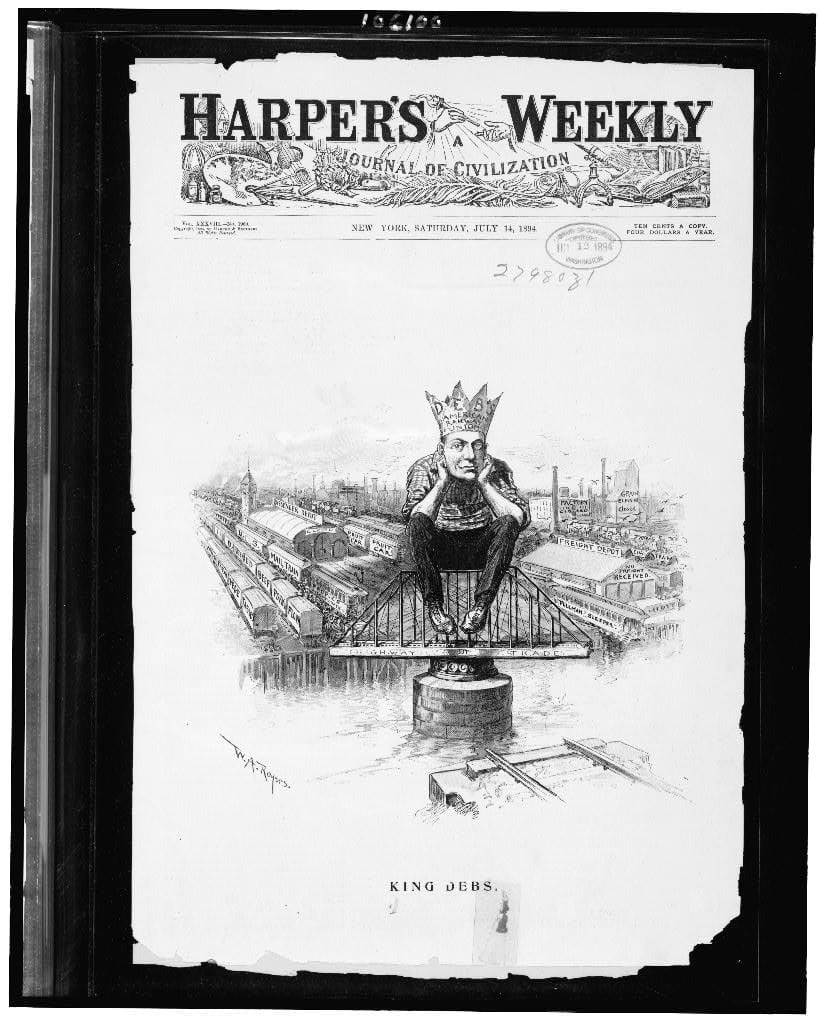


Next Document
Annual Message to Congress (1894)
December 03, 1894
Conversation-based seminars for collegial PD, one-day and multi-day seminars, graduate credit seminars (MA degree), online and in-person.

No study questions
No related resources
A recession in 1893 led the Pullman Sleeping Car Company to reduce the wages of its workers. When it reduced wages, it did not reduce rents in the company housing it supplied its workers. As a result, the workers went on strike May 11, 1894. Eugene V. Debs had recently organized the American Railway Union (ARU). Although at first reluctant to get involved, he eventually seized on the Pullman strike as an opportunity to organize Pullman workers and add them to the ARU’s members. The Pullman Company refused to recognize the union. To make the strike effective, Debs organized a boycott of any train that had a Pullman car. Other labor leaders and labor organizations opposed the boycott, but ARU members around the country were able to disrupt interstate rail traffic, including that which carried the US mail. (See “King Debs,” Harper’s Weekly, July 14, 1894 for one example of the public perception this created of Debs and his union.)
To get the mail moving, President Grover Cleveland ordered US attorneys and the Army to deal with the strike, which had included acts of violence against trains and other railroad property. (The Governor of Illinois, seeing the strike as a state and local matter, claimed that Cleveland had no constitutional right to do so.) A federal court issued an injunction barring the union from hindering railroad traffic. Debs ignored the injunction. He was arrested on federal contempt and conspiracy charges. The conspiracy charge was dropped, as Debs mentions, but he was ordered to jail for contempt for ignoring the injunction. His attorneys appealed. The Supreme Court decided unanimously in In re Debs in favor of the US government and the power of the Federal courts to issue an injunction against the strike.
The Supreme Court’s decision was a setback for labor, as the courts proved willing in ensuing years to issue the injunctions that the Supreme Court had approved. As the Strike Commission report argues, however, outside the courts organized labor was finding its place in American life. In a conciliatory move, six days after the Pullman strike ended, Congress passed and Cleveland signed a law that established Labor Day, a national holiday honoring workingmen. In 1932, the Norris-LaGuardia Act gave unions full freedom of association and outlawed the kind of injunctions the Supreme Court had approved to end the Pullman strike. Public opinion toward unions changed in part because of the growing perception of the power of the so-called trusts. A “trust” was a way of establishing control over a number of firms operating in the same area of the economy. Shareholders in different corporations transferred their shares to one corporate entity that held them (hence, a “holding company”). A trust could be used to establish a monopoly over an area of the economy. For this reason, “trust busting” became part of the U.S. government’s effort to ensure free markets in the United States.


Conversation-based seminars for collegial PD, one-day and multi-day seminars, graduate credit seminars (MA degree), online and in-person.